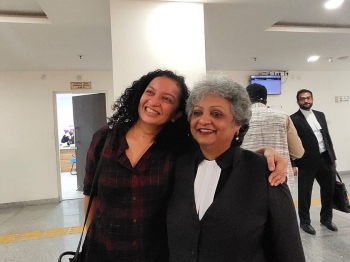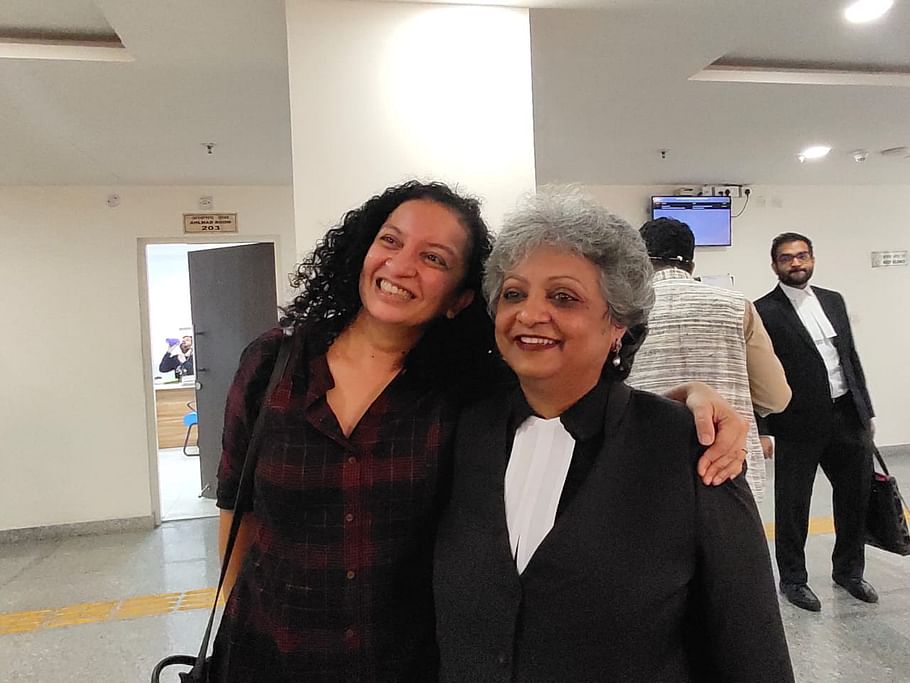
.jpg) Adv Jessy Kurian
Adv Jessy Kurian

After a historic judgement by the Supreme Court where it held that a homemaker’s household work is equal to her husband’s office work, here comes a landmark judgement by a Delhi court which held that a woman has the right to express her grievances on any platform she wishes.
On 17th February, the court acquitted journalist Priya Ramani in the criminal defamation case filed by former Union Minister M J Akbar over the “MeToo” sexual harassment allegations made by her.
The Additional Chief Metropolitan Magistrate Ravindra Kumar Pandey in ‘M. J. Akbar vs. Priya Ramani’ held that a woman has the right to put her grievance on any platform she wishes.
The case was filed by M J Akbar in October 2018 after he was accused by several women of sexual harassment, following a tweet by Ramani as part of the ‘MeToo’ movement revealing that the person referred to as a ‘sexual harasser’ in an earlier article written by her in “The Vogue” was Akbar.
His main contention was that he had enjoyed a “stellar reputation” in the society, which was damaged by her tweet and therefore she was liable for criminal defamation.
However, the Court observed that a man of social status can also be a sexual harasser. Despite how well-respected some persons are in society, they in their personal lives could show extreme cruelty to females. Sexual abuse takes away dignity and self-confidence. Right of reputation can’t be protected at the cost of right to dignity.
The society is quick to condemn a woman who delays in filing a sexual abuse case, alleging mala fide intention on her part to malign the accused or a person of ‘stellar reputation. On this count, the Court said, “Woman has the right to put her grievance at a platform of her choice even after decades”. This goes to show that a woman can file the petition at any time.
Very often when a woman raises voice against such an incident, she is made an accused by the society or her community based on her customs, traditions, and family prestige. The society fails to understand the trauma and societal stigma a woman faces after such incident. Here the Court rightly said, “The society must understand the impact of sexual abuse and harassment on its victims”.
The Court comes to the rescue of women and urges women to raise their voice against sexual abuse when it said, “Woman cannot be punished for raising voice against sex abuse”. ‘Woman’ means any woman in any profession, any work, belonging to any religion. It includes a woman who has embraced any life-style, including a religious woman, a nun.
The Sexual Harassment of Women at Workplace (Prevention, Prohibition and Redressal) Act was passed in 2013 to provide protection against sexual harassment of women at workplace and for the prevention and redressal of complaints of sexual harassment. It is based on the ground that sexual harassment results in violation of the fundamental rights of a woman to equality under Articles 14 and 15 of the Constitution of India and her right to live with human dignity enshrined under Article 21.
A woman has the right to practice any profession or to carry on any occupation, trade or business which includes a right to a safe environment free from sexual harassment. The protection against sexual harassment and the right to work with dignity are universally recognised human rights by international conventions and instruments such as Convention on the “Elimination of all Forms of Discrimination against Women” which has been ratified on 25th June, 1993 by the Government of India.
According to the Act, an employee means (Section 2(f)) a person employed at a workplace for any work on regular, temporary, ad hoc or daily wage basis, either directly or through an agent, including a contractor, with or, without the knowledge of the principal employer, whether for remuneration or not, or working on a voluntary basis or otherwise, whether the terms of employment are express or implied and includes a co-worker, a contract worker, probationer, trainee, apprentice or called by any other such name.
‘Workplace’ can be a public or private sector or organised or unorganised sector. It can be any establishment where a woman is employed.
Section 4 of the Act emphasises on the constitution of an Internal Complaint Committee in every establishment to address the redressal of a woman regarding sexual harassment.
However, it is unfortunate that even after 7 years of the passing of the Act, most of the institutions in the country have not constituted Internal Complaint Committee including Government sector. Another disadvantage of the Act is that if a woman complained about sexual harassment by the employer, it is looked into by an Internal Complaint Committee consisting of employees appointed by the employer. Hence there is a possibility of bias against the woman.
Sexual harassment includes (Section 2(n) physical contact and advances, or a demand or request for sexual favours, or making sexually coloured remarks, or showing pornography, or any other unwelcome physical, verbal or non-verbal conduct of sexual nature. These acts can be either directly or by implication.
Very often women face implied or explicit promise of preferential treatment in her employment or implied or explicit threat of detrimental treatment in her employment or implied or explicit threat about her present or future employment status; sometimes she also faces interference with her work or creating and intimidating or offensive or hostile work environment for her or humiliating treatment likely to affect her health or safety. These acts also amount to sexual harassment.
Every woman should claim her right to equality and her right to live with human dignity. Women should raise voice against sexual harassment. Strict implementation of the Act is needed. Government should see that ‘Internal Complaint Committee’ is constituted in every establishment in public and private sector.
It is undisputed that women are not always getting justice in cases of sexual harassment. However, the judgement in Priya Ramani case is a boost for women to claim their right to equality and raise their voice against sexual harassment.